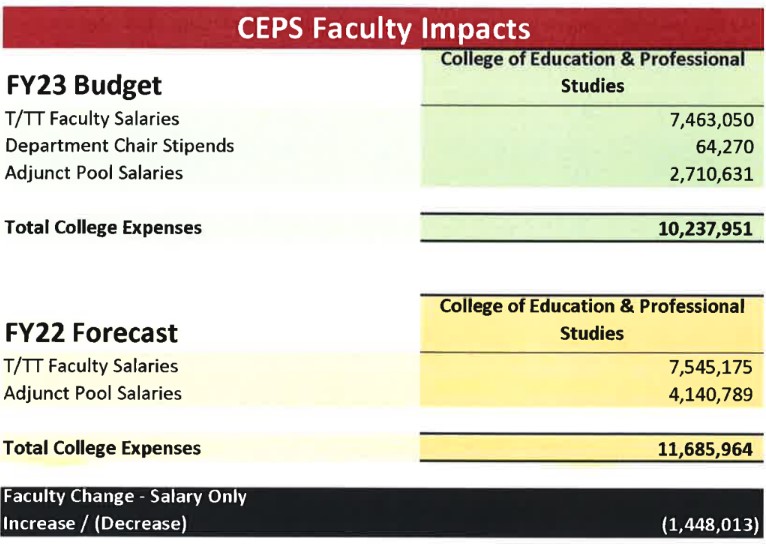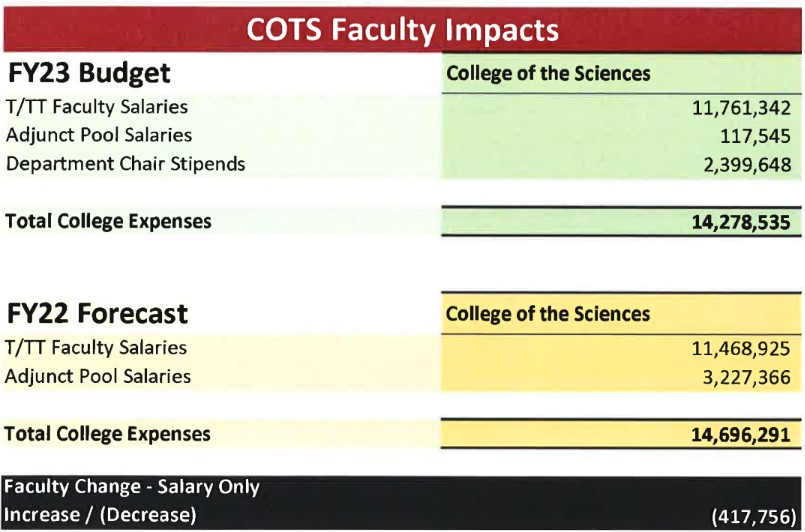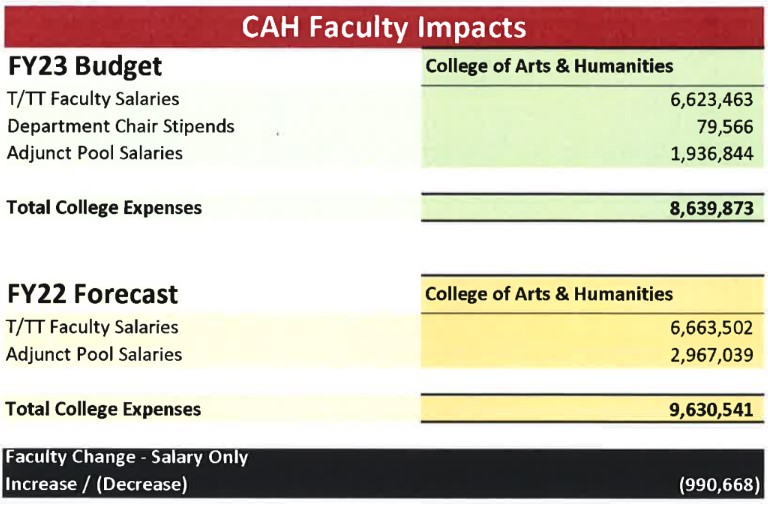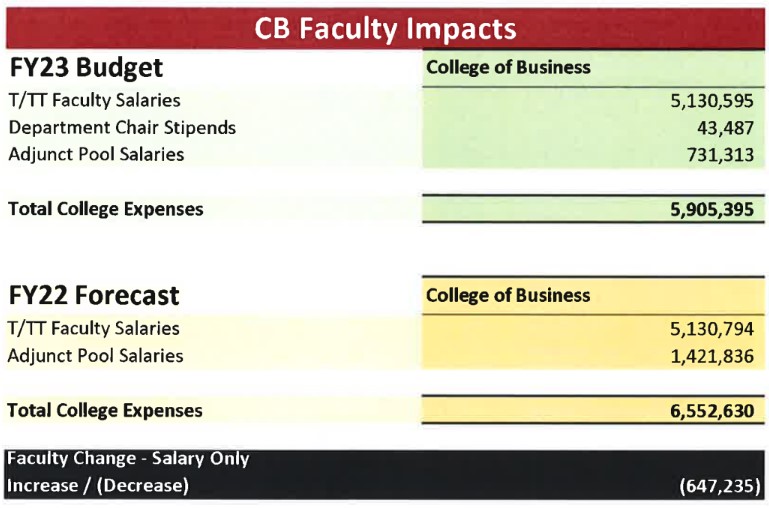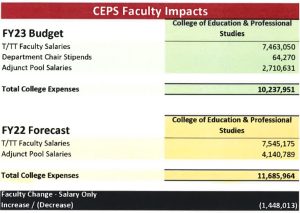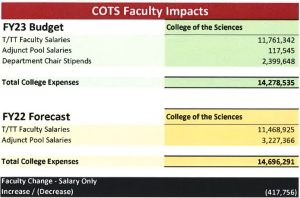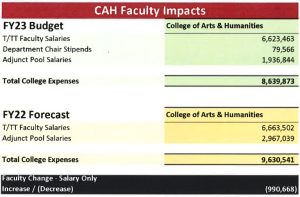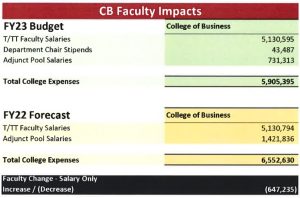2023 budget projections reflect impending cuts
Impact less severe than originally anticipated
April 6, 2022
The 2023 budget projections reflect decreases in Non-Tenured Track (NTT) faculty salary from previous years across all departments, with the Colleges of Education and Professional Studies, Arts and Humanities and Business facing the greatest losses.
In contrast with the initial budget projections that sparked concern (see “Fall enrollment projections spark concerns over NTT faculty job security”), the decreases have lessened over the past month.
The College of Education and Professional Studies went from a $1.4 million decrease to a $1.1 million decrease, the College of Arts and Humanities went from a $990,668 decrease to a $779,479 decrease, the College of the Sciences went from a $736,704 decrease to a $417,756 decrease and the College of Business went from a $647,235 decrease to a $523,949 decrease.
While the most recent budget projections show less loss than before, they still signify a decrease that will impact each college.
According to Vice President of Financial Affairs Joel Klucking, the impact of the cuts will vary greatly from department to department. He said departments that teach more general education courses were initially impacted, because the pandemic caused first year classes to be smaller over the last couple years.
“Now we’re seeing some of those smaller classes roll through, and they’re starting to get into their 300 and 400 level classes, and that’s having a bigger impact on the departments that really don’t participate in general education courses,” Klucking said. “There are lots of varying levels and ratios of tenured to non-tenured faculty, so this process could be felt much differently based on what your population looks like from a faculty perspective.”
While preparations are being made for some amount of fall cuts, the final numbers won’t be solidified until October, according to Klucking. He said the budget is determined half by money granted to CWU from the state government, and half by tuition and fee revenue.
“The state number is pretty well known, they do a two-year budget and we are heading into the second year,” Klucking said. “The big question is how much tuition and fee revenue are we going to get, and that’s entirely dependent on how many students we enroll. We really don’t find out for sure until the fall.”
Klucking said the budget situation could have been significantly worse and is staying optimistic.
“I think it’s good that the university is scaling its operations to the number of students that we have,” Klucking said. “I’m actually quite happy with where we ended up. We increased our enrollment projection a few weeks ago, and that took quite a bit of pressure off the colleges as far as looking at what their schedule is going to look like.”
Concerns were previously expressed across multiple departments by department chairs, faculty senate members, administrative staff and NTT faculty members about the handling of potential budget cuts, the job security of NTT faculty and the best course of action (see “Fall enrollment projections spark concerns over NTT faculty job security”).
A letter was drafted by members of the Faculty Senate, Academic Department Chairs Organization (ADCO) and the Budget Planning Committee expressing these concerns to President James Wohlpart’s administration and the union.
The letter states: “We are in difficult times financially, and cuts to NTTs are unavoidable. But we believe there are ways to communicate value and care to those facing the prospect of not being rehired.”
The letter mentioned the great importance of NTT faculty to CWU and the geographical isolation of Ellensburg leading many NTT faculty members to spend their whole career in this town.
The letter was sent with intent to answer the following questions: When will NTT faculty be informed of the upcoming cuts? Is there a way to provide clarity about how NTT contract decisions will be made? Will NTT faculty who are laid off be rehired if enrollment increases? What resources are available for NTT faculty facing job loss?
With the seemingly inevitable cuts looming, NTT faculty member and executive board member of the Faculty Senate David Douglas said he is cautiously optimistic after presenting the letter.
“After the reading of the open letter to administration and to the union, the result of that is encouraging because the president did respond and he has met with the signers of those letters, and there is going to be continued conversation about the issues that were brought up,” Douglas said.
Douglas said faculty members have tried sending letters like this in the past that were not met with the same response and action as they are receiving from Wohlpart now.
“The history is that we’ve written these types of letters in the past and we’ve asked for more clarity … and in past administrations, we’d been told it was going to happen and it didn’t really happen,” Douglas said. “With the president’s response being pretty immediate with some action behind it, I think this one maybe is going to have some positive effect.”
Klucking said he appreciates Wohlpart’s engagement throughout the entire process.
“The engagement from early on once we realized we had a potential problem, and bringing our governance systems and faculty leadership into the conversation, has been very helpful and different than what we’ve done in the past,” Klucking said.
Wohlpart declined to comment until a later time when the plans have become more solidified.



